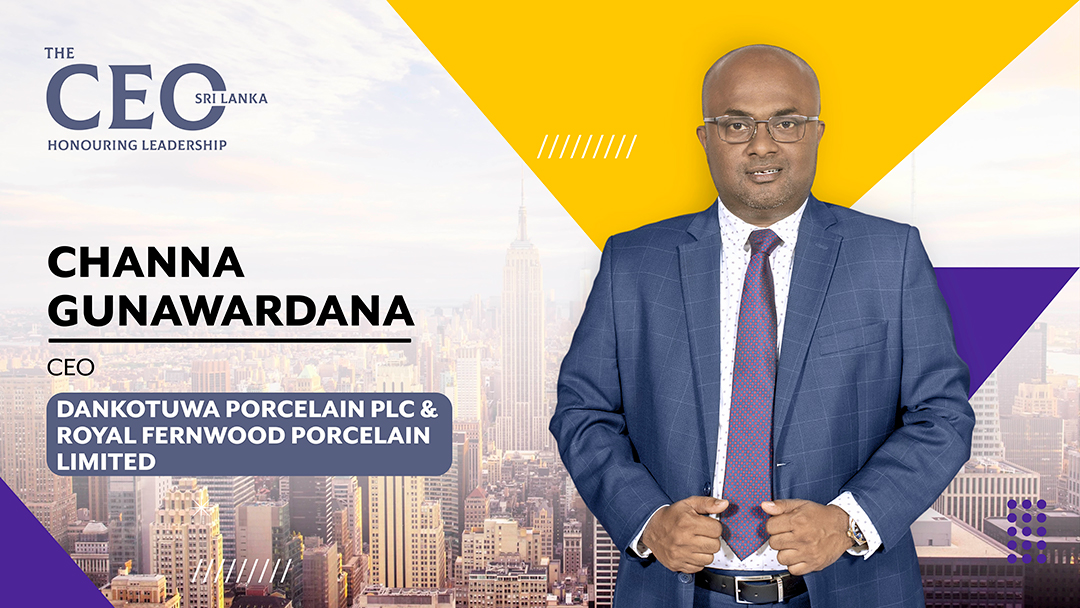Mastering the art of porcelain tableware, Channa Gunawardana the CEO of Dankotuwa Porcelain PLC and Royal Fernwood Porcelain Limited, is a leader thriving to endure the timeless and redefining designs for the Porcelain Industry.
Globally recognized for its luxurious and elegant porcelain tableware, Dankotuwa Porcelain continues to win the hearts of millions within the nation and around the world. The high whiteness levels, luxurious gold, platinum designs and the vastly improved imprinting techniques of decals – all of which radiates a sense of pristine beauty – have earned the company a reputation for being the preferred choice, be it for extravagant indulgences, gifting purposes, catering to the diversity of the international palate within the scope of lifestyle-based products, casual eating or even high-end dining.
Channa is a fellow member of the Chartered Institute of Management Accountants (UK) and a fellow of the Chartered Accountants of Sri Lanka. He also holds an MBA from the University of Southern Queensland, Australia. Holding a First-Class degree from the Department of Accountancy and Financial Management of the University of Sri Jayewardenepura, he is currently reading for his PhD at Management and Science University in Malaysia. Not only is he a member of the Global Council of CIMA, UK, Channa is additionally recognized as the country’s leading CIMA Case Study Lecturer who conducts leadership programs for youth in his spare time.
Being the Country Manager of Ernst & Young, Maldive and a part of Apparel Operations in Bangladesh, Channa has extensive experience when it comes to handling global operations. Furthermore in 2015, he was instrumental in setting up one of the pioneering manufacturing plants in the emerging apparel market in Africa. Channa served the Hirdaramani Group for 12 years and was the Chief Operating Officer of Knit Cluster towards the end of his Hirdaramani years where he was responsible for operations of 10 manufacturing units. It was after his time at Aitken Spence Group as the CEO/Directors of Aitken Spence Garments Ltd. that he joined Dankotuwa Porcelain PLC.
“Common sense is uncommon”, says Channa, reflecting on the years and different phases of his life. “Qualifications are important in one’s journey to succeed. However, when qualifications are given priority without basing and supporting it with common sense, it ends with quite a disturbance to the processes of the organization”. He believes his burgeoning success was also shaped by the endless people he has crossed paths with while gaining experience holistically, thus molding him to become the leader that he is today. He goes on to emphasize on how people tend to overlook common sense, deeming it to be too common, while failing to address practical issues effectively.
“As Sri Lankans, we feel Dankotuwa is a critical part of who we are in many different perspectives. We are a proud Sri Lankan Company, both managed and owned by Sri Lankans who delightedly cater to the tableware needs of our own people, not only in Sri Lanka but also across the world We are also proud of the fact that we continue to place Sri Lanka on the world map through the various products we export” Channa states, with a sense of pride.
Commenting on the current state of Sri Lanka, Channa says, “We understand that the country is going through challenging times. However, Sri Lanka has always been resilient and therefore will always overcome this situation and come out stronger”. He goes on to say that, “We as Sri Lankans have endured worse times and yet we survived. I am sure this time will be no different.”
Channa enlightens us about how the current issues regarding the economy and challenges faced due to COVID posed great opportunities for individuals and organizations to work together, while displaying a sense of resilience as a company and as a country. He believes that the culture within Dankotuwa has progressed and transformed in the recent past to create an environment where everyone is striving to do their best. The organization has not only taken initiatives to sustain the growth of the Company but also to assist its people who are severely impacted by the crisis.
Dankotuwa strives to be an organization where employees are encouraged to voice their opinion even when there are disagreements with the management’s decisions. The right leader understands that disagreements bring clarity and enable better judgment in difficult situations. “Therefore, these different opinions are neither completely accepted nor rejected. Instead, it is used as a stepping-stone to arrive at an even better decision” Channa states confidently.
Following a concept called “Collective Leadership” at Dankotuwa, has resulted in the Company reaping positive results/benefits. “Collective Leadership” is the concept of forming small teams of 6 employees and bestowing them with leadership responsibilities to manage all affairs of the Company for a specific period of time. These teams include members from all levels and functions of the company, facilitating higher employee engagement and leadership building across the organization. Through this initiative, employees have been empowered with resources and therefore are expected to use their common sense and make logical decisions. “I am of the view that I don’t have knowledge of everything, and I am not superior to anyone else. I believe in the synergistic effect of working together rather than individually. I must say that this concept was very effective. In addition, this enabled employees of our organization to identify their true potential and showcase their best performance within an unfavorable environment that we faced during the past” he confirms.
Channa believes that these tactics have indeed helped in molding people at Dankotuwa. He possesses a strong affirmation of the fact that the people employed by Dankotuwa are all talented and unique with different leadership abilities. “They will never be a CEO like me, but they are all capable of being different types of CEOs. My job is to facilitate this and ensure that they are the best versions of themselves, rather than confining them into a frame and getting them to follow it” he states optimistically.
“My role as the CEO is to facilitate the work of others, as revenue and profits are built by the rest of the employees”, claims Channa. On the other hand, he mentions that the CEO has a tremendous responsibility of setting the tone of the organization. “The actions and the decisions taken have a lasting impact across the company. Therefore, it must be ensured that the leader is mindful of creating the right culture within the organization. An ideal working culture should include mutual respect, togetherness, and appreciation. This must be practiced regularly. I believe that culture is as critical even more than strategies and plans. An organization with great strategies and plans might even collapse if the culture is not set right”, he says.
Channa holds the view that CEOs are appreciated too much when things go right. One needs to be aware of that. “As CEOs, our job is to create the right culture and environment for others and not just to work hard. Our job is to get everyone to believe that they can do more than what they themselves think they can do”.
Giving us an insight on the Sri Lankan organizations, he mentions that there is a major mismatch between the function of leadership and the function of management. Channa explains that some of the organizations have ‘Great Managers’ operating under the label of ‘Leaders’, thus trying to get things done without appreciating the culture or people of the organization. He states that this will only give them short-term success.
In conclusion, Channa shares his perspective on a much-needed topic, humanity. He encourages all to be great human beings within the office environment, where mutual respect is practiced in doing what is right for the organization. Honesty, integrity, and appreciation of others will no doubt result in thriving organizations. “My general advice for everyone is that; be a better human being. This will resolve most of the issues taking place between management, leadership and employees in general. It will also create a peaceful environment for everyone to be happy, grow and thrive”.


